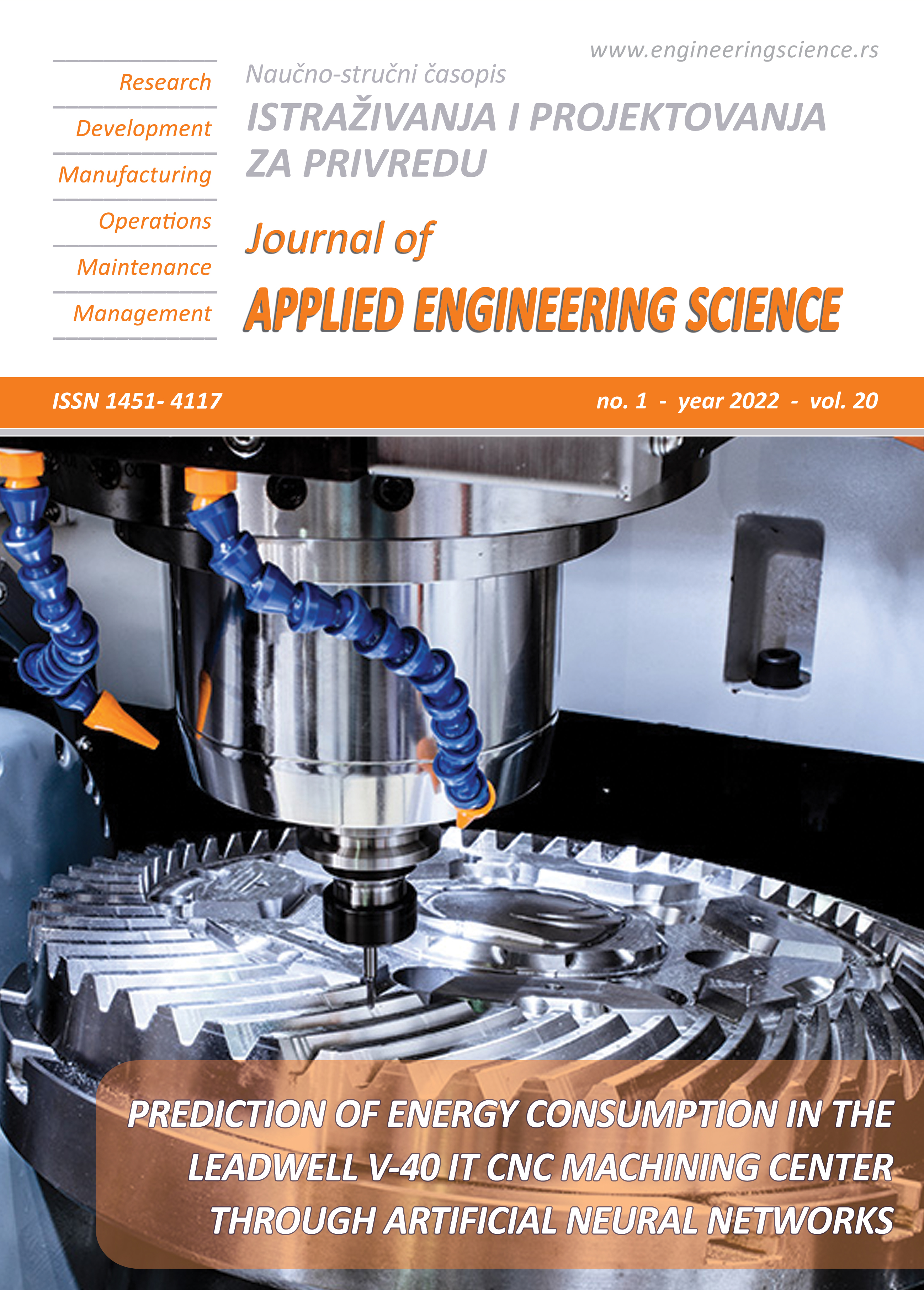INVESTIGATION OF THE METHOD OF THERMAL FRICTION TURN-MILLING OF HIGH STRENGTH MATERIALS
Abstract
An analysis of the state of the matter of the manufacture of parts such as bodies of revolution has shown that there is a problem of turning processing by turning large, long parts, connected with increasing productivity and processing quality, as well as reducing the costs of turning operations. To solve this problem, the authors propose a resource-saving combined method for treating external cylindrical surfaces by thermal friction turn-milling.
Experimental studies were performed on the processing of the outer cylindrical surface using a special friction cutter made of non-instrumental material. The results showed that with thermal friction turn-milling, it is possible to achieve Ra = 1,0 mcm. The process of chip formation was also investigated and the formation of a retarded layer was established, which protects the surface of the friction cutter from wear.
Optimum values of cutting conditions for processing by thermal friction turn-milling of steel 30HGSA.
References
Selivanov, A.N., Nasad, T.G., Tormanov, S.Y. (2011). Experimental investigations of chip formation during processing of titanium alloy VT 1-0 with the method of high-speed circumferential milling. Bulletin of the CSTU. №2(56). Issue 2.- Р.138-144.
Sherov, K.T., Sikhimbayev, M.R., Nasad, T.G., Absadykov, B.N., Izotova, A.S., Okimbayeva, A.E., Кuanov, I.S. (2020). The research of the steel cutting blade reliability for thermo-frictional processing. News of the National Academy of Sciences of the Republic of Kazakhstan. Series of geology and technical sciences. Volume 1, Number 439, P.122 – 130. https://doi.org/10.32014/2020.2518-170X.15
Sherov, K.T., Mussayev, M.M. (2016). Calculation of shrinkage ratio for processing 30KhGSA steel with milling. Mechanics and technology. – Taraz: Publishing house "Taraz University" TarSU them. M.H. Dulati, №3- Р.36-42.
Sherov, K.T. and Mussayev, M.M. (2017). Device for thermal friction cutting of metal workpieces. Patent RK for utility model, No.2165. Bul. №9.
Zhunusbekova, Zh.Zh, Kadyrov, A.S. (2016). Study of digging machine flat element loading in clay solution / Journal "Naukovyi Visnyk Natsionalnoho Hirnychoho Universytetu" Volume №2 (152), P.30-33. http://nvngu.in.ua/index.php/ru/component/jdownloads/viewdownload/60/8473
Ganyukov, A.A., Kadyrov, A.S., Balabekova, K.G., Kurmasheva, B.K. (2018). Tests and calculations of structural elements of temporary bridges / Roads and Bridges - Drogi i Mosty 17 215 – 226. DOI: 10.7409/rabdim.018.014
Usubamatov, R., Zain, Z.M., Sin, T.C., Kapaeva, S. (2016). Optimization of multi-tool machining processes with simultaneous action. Int J Adv Manuf Technol 82, 1227–1239. https://doi.org/10.1007/s00170-015-6920-x
Dudak, N., Taskarina, A., Kasenov, A., Itybaeva, G., Mussina, Z., Abishev, K., Mukanov, R. (2017). Hole Machining Based on Using an Incisive Built-Up Reamer // International Journal of Precision Engineering and Manufacturing, Volume 18, Issue 10, Pages 1425-1432. https://doi.org/10.1007/s12541-017-0170-9
Venkatesan, K. (2017). The study on force, surface integrity, tool life and chip on laser assisted machining of inconel 718 using Nd:YAG laser source, Journal of Advanced Research, Vol.8, pp 407-423. https://doi.org/10.1016/j.jare.2017.05.004
Khodzhibergenov, D.T., Esirkepov, A., Sherov, K.T. (2015). Rational milling of metals. Russian Engineering Research. Allerton Press, Inc. Vol. 35. No 1. pp. 43-45. DOI: https://doi.org/10.3103/s1068798 x1501013x
Sherov, K.T., Sikhimbayev, M.R., Donenbaev, B.S., Sagitov, A.A., Ainabekova, S.S. (2017). Experimental Research of Rotational-and-Frictional Boring of Big Holes in Large Parts / Journal of Theoretical and Applied Mechanics, Sofia, Vol. 47 No. 4 pp.23-36. https://doi.org/10.1515/jtam-2017-0018
Abbas, A.T., Ragab, A.E., Al Bahkali E.A. and El Danaf E.A. (2016). Optimizing Cutting Conditions for Minimum Surface Roughness in Face Milling of High Strength Steel Using Carbide Inserts, Advances in Materials Science and Engineering, Vol.2016, p 14. https://doi.org/10.1155/2016/7372132
Kushnazarov, I., Sherov, K. and Altynbaev, R. (2007). Technology of thermal friction milling with high-frequency cooling, High technologies in mechanical engineering: Proc. of scientific works of NTU, Ukraine, P.134-139.
Sherov, K.T., Mardonov, B.T., Zharkevich, O.M., Mirgorodskiy, S., Gabdyssalyk, R., Tussupova, S.O., Smakova, N., Akhmedov, Kh.I., Imanbaev, Y.B. (2020). Studying the process of tooling cylindrical gears / Journal of Applied Engineering (JAES) Science, Vol. 18, No. 3 – P. 327-332. https://doi.org/10.5937/jaes18-23794
Nasad, T.G., Absadykov, B.N., Tusupova, S.O., Sagitov, A.A., Abdugaliyeva, G.B., Okimbayeva, A.E. (2019). Formation management in parts processing regenerated by surfacing. / News of the Academy of Sciences of the Republic of Kazakhstan, Kazakh national research technical university named after K.I. Satpayev. Series of Geology and technical sciences, №3 (435) – Р.102-108. https://doi.org/10.32014/2019.2518-170x.74

